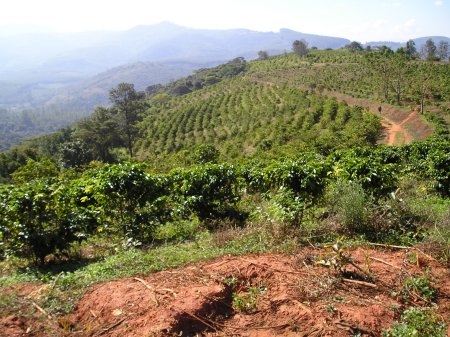Local Project Management
The Zimbabwean local management unit (LMU) consists of the Project Manager (Mr. Dagmore Tawonezvi) and an administrative assistant (Ms Beauty Nyamukonda). The project is under the Government of Zimbabwe’s Ministry of Agriculture and the Ministry of Industry and International Trade.
Progress in Zimbabwe
The main prerequisites of the WRS are in place:
- Banks including Kingdom bank and Agriculture Development Bank are ready to finance against Warehouse Receipts.
- The Zimbabwe Coffee Mills (ZCM) has signed up as a warehouse operator under the coffee pilot, while the Grain Marketing Board (GMB), will provide warehousing for soyabean.
- ITS-Socotec, a collateral management company, is managing the receipted commodities and issues Warehouse Receipts.
- Standard Warehouse Receipts have been printed and are ready for use.
- Participating farmers have been trained in coffee and soyabean quality issues.
Coffee Sector Pilot
Zimbabwe’s coffee production is concentrated in the mountainous Eastern Highlands of Manicaland Province

A sizeable number of farmers are also located in Mashonaland Province. Most coffee in Zimbabwe is commercially produced, while smallholders, who account for approximately 5% of output, are mainly organised into producer associations and collective groups. The smallholder groups participating in the WRS include the Honde Valley Coffee Growers Association (HVCGA) and the Vumba Agricultural Collective Cooperative Society (VACCS). The HVCGA consists of nearly 500 members, most producing coffee on plot sizes ranging from 0.5-0.8 hectares. The association was formed mainly to facilitate crop marketing and inputs procurement. VACCS has 23 share-holding members. All members, with the help of casual and permanent staff, work and market their coffee together. In recent years, the area under coffee production has decreased to about 24 hectares.
In previous financing arrangements, all smallholder farmers would be advanced up to 80% of the coffee value by the coffee mills at delivery. They would receive the rest of the money after the coffee has been sold. This process, from delivering coffee to the mill to when coffee is sold, takes on average a period of 2-3 months. The VACCS group, however, would not receive this inventory advance, (as this does not apply to farmers on plots bigger than 20 hectares). Instead they would receive 20% of the value of the expected yield, just soon after coffee flowering stage. Yield is estimated through a triangulation process based on an assessment of coffee flowers. Although this early financing helps to improve the group’s cash-flow, both groups face considerable cash-flow problems as there are big time lags between harvest and sale of coffee.
The WRS Project aims to alleviate these cash-flow problems faced by smallholder farmers. However, this could not be achieved during the 2004/05 pilot season because of declining output and high financing costs.
Soyabean Sector Pilot
Soyabean is a commodity grown in many areas of Zimbabwe, both by large and small scale producers. The WRS Project Pilot in soyabeans is in Mashonaland West - Chinhoyi and Mhangura Districts.
The soyabean sector offers a promising opportunity to demonstrate that the WRS could be a viable means of marketing agricultural commodities in Zimbabwe. In normal circumstances the average period of storage of the collateralised stocks will be between six and eight months, over which prices normally tend to rise significantly.
The WRS team is anticipating substantial deposits during the 2005/06 pilot season. Sensitisation, farmer mobilisation and quality training are the LMU’s main focus of activities. Some producer promotional materials have been developed and used for WRS. [View Here]
